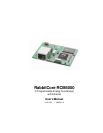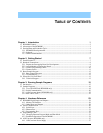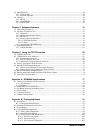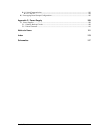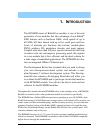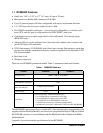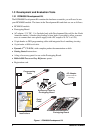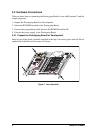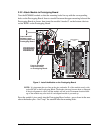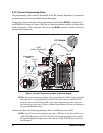
2 RabbitCore RCM4000
1.1 RCM4000 Features
• Small size: 1.84" × 2.42" × 0.77" (47 mm × 61 mm × 20 mm)
• Microprocessor: Rabbit 4000 running
at 58.98 MHz
• Up to 29 general-purpose I/O lines configurable with up to four alternate functions
• 3.3 V I/O lines with low-power modes down to 2 kHz
•
Five CMOS-compatible serial ports — f
our ports are configurable as a clocked serial
ports (SPI), and one port is configurable as an SDLC/HDLC serial port.
• Combinations of up to eight single-ended or four differential 12-bit analog inputs
(RCM4000 only)
• Alternate I/O bus can be configured for 8 data lines and 6 address lines (shared with
parallel I/O lines), I/O read/write
• 512K flash memory, 512K SRAM, with a fixed mass-storage flash-memory option that
may be used with the standardized directory structure supported by the Dynamic C FAT
File System module
• Real-time clock
• Watchdog supervisor
There are two RCM4000 production models. Table 1 summarizes their main features.
The RCM4000 is programmed over a standard PC serial port through a programming cable
supplied with the Development Kit, and can also be programed through a USB port with an
RS-232/USB converter or over an Ethernet with the RabbitLink (both available from Rabbit
Semiconductor).
Appendix A provides detailed specifications for the RCM4000.
Table 1. RCM4000 Features
Feature RCM4000 RCM4010
Microprocessor
Rabbit
®
4000 at 58.98 MHz
SRAM 512K
Flash Memory (program) 512K
Flash Memory
(mass data storage)
32 Mbytes (NAND flash) —
A/D Converter 12 bits —
Serial Ports
5 shared high-speed, CMOS-compatible ports:
5 are configurable as asynchronous serial ports;
4 are configurable as clocked serial ports (SPI);
1 is configurable as an SDLC/HDLC serial port;
1 asynchronous serial port is used during programming
1 asynchronous serial port is dedicated for A/D converter (RCM4000)



